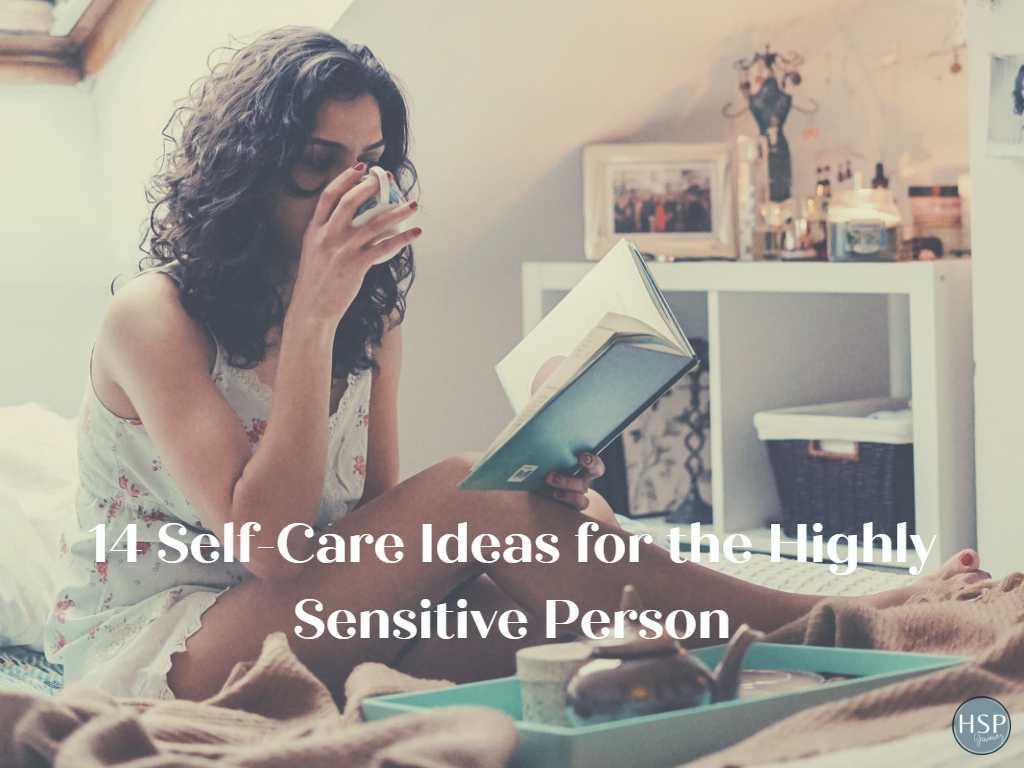Self-care ideas for the Highly Sensitive Person is an incredibly important topic, one that needs revisiting on a regular basis. Also known as the Sensory Processing Sensitivity Trait, being highly sensitive doesn’t mean that you have a disorder or medical diagnosis, it means that you have more mirror neurons in your brain which cause you to pick up on more stimuli in your environment.
Where most non-HSPs aren’t bothered by loud crowds, bright lights, and lack of privacy, HSPs are. Many environments such as work, school, and even church are noisy and highly stimulating, Those who identify with the Highly Sensitive Person trait, often find themselves in constant need of self-care ideas to calm their unique nervous systems.

Table of Contents
Self-Care Idea #1 – Rest and Sleep
Many who identify as highly sensitive discover that they need more sleep than their friends or spouse. My husband, who is not an HSP, needs an hour less sleep than I do each day. While most advice recommends a minimum of eight hours of sleep, I find that eight hours is rarely enough. Finding the balance between sleep and rest can help. Learning to nap or power nap proves useful as a way to decrease stimulation in the middle of the day. It can be tough to figure out how much sleep you need. Some advice suggests that you count 7.5 or 8 hours from when your alarm clock goes off to start, and push your bedtime back 15-30 minutes per night until you wake up before your alarm clock or phone alarm goes off. This helpful article shares the approximate number of hours you should need according to age.
Self-Care Idea #2 – Eat Well
HSPs tend to have a strong mind-body connection. This means that what we eat can affect us slightly more than others. The number of HSPs who struggle with gut-related experiences is also greater. Irritable Bowel Syndrome as well as constipation are just a few gut issues that HSPs find themselves experiencing. Eating a low-fat, vegetable and fruit-rich diet is important to combat some of the somatic experiences we HSPs find ourselves in.
According to Harvard Medical School research, “The enteric nervous system that regulates our gut is often called the body’s “second brain.”Caring for our digestive needs is vital and can become a way that we employ self-care on a daily, if not hourly, basis.
I no longer take lunch at my desk. I found after years of doing this, I would get indigestion as I tried to work and eat at the same time. Taking 10-15 minutes to unwind, put my feet up, and watch a funny YouTube video while I eat allows my gut to relax and accept the nutrition I’m providing it. I also love tea time every afternoon. A small cookie or piece of toast with a well-brewed cup of Earl Grey hits the spot and helps me feel well-loved by myself. Overall, eating well promotes a healthy nervous system, which is important for HSPs.
Self-Care Idea #3 – Take Care of your Body
It might sound elementary, but it’s important to take regular showers, trim and file your nails, wear good shoes, and even clean behind your ears. Using nice smelling lotions and deodorant can boost a feeling of value around your body and your appearance. Brush and comb your hair and add in other ways to care for your body such as regular doctor visits, mammograms, OBGYN checkups, and going to the dentist are important ways to care for your HSP body.
There are also some vital self-care tools, in my humble opinion, that make massaging and relaxing your body an easier task.
8 Self-Care Tools for the Highly Sensitive Person
Self-Care Idea #4 – Maintain Relationships
If you’re an introvert as 70% of HSPs are, according to Dr. Aron, you may have to muster up more energy to reach out to family and friends to stay connected. This is normal. But staying isolated is not good for your mental health. Setting regular habits to call your mom, your best friend, or your walking partner can mean the difference between feeling happy and feeling blue.
For me, it helps to set a goal of several phone calls a week to my mom, best friend, and closest aunt helps me feel connected and supported. I also aim to walk with a friend once a week and meet a friend for lunch weekly. If you live with a house full of people, you might use up all your social time with your immediate family. Take care to try and connect with one or two friends outside your immediate family if possible. Having a support system around you can make all the difference in the world, especially when you need to ask for help (another great thing to practice doing to maintain relationships).
Self-Care Idea #5 – Minimize Caffeine and Alcohol
Many HSPs report that they are extremely sensitive to caffeine of all kinds. Some can handle tea but not coffee. Others (like me) love coffee but limit ourselves to 1-2 cups a day. Alcohol can have strange effects on HSPs and often make them tired or make them feel sick. I’ve found that I enjoy red wine, but I have to drink a small amount regularly to build up my tolerance. If I don’t have a glass of wine for weeks then suddenly have one, I’m three sheets to the wind with four ounces.
So, test the waters in a safe environment to see how you and alcohol get along. When possible, avoid drinking too much to cover up strong emotions, as this can quickly become a bad habit. HSPs need to feel clear-headed most of the time to maximize our creativity and experience the highs and lows of life. Alcohol is tricky, so use it sparingly and wisely.
Self-Care Idea #6 – Get Regular Exercise
HSPs need regular exercise just like everyone else. The difference is that we HSPs tend to like individual activities or walking with a friend more than high-intensity rigerous fitness classes or bootcamps. Going on a hike, walking a nature trail, or doing yoga in the park are wonderful ways to blend exercise with self-care tip #7, getting outdoors, and #8, employ grounding techniques. Being in nature helps ground HSPs physically and emotionally. When combined with moderate exercise such as walking or running, being in nature can pack a double punch of resetting your mood, grounding you to the natural world, and refreshing your outlook on life.
Many a Highly Sensitive Person finds that Tai Chi and Yoga are lovely practices to do from the comfort of their own homes or in small groups at peaceful studios. Once yoga studio I used to do classes at had no mirrors like typical exercise studios. I found this lack of visual stimulation to be wonderfully refreshing. I paid less attention to how I looked in my leggings and gave more thought to my positions and to building strength.
Some exercise studios have lots of mirrors, loud music, and even teachers who yell moves into their microphones. This can be distrating for HSPs and provide too much stimulation. Exercise should feel refreshing, healthy, and avoid brash or loud noises, in my opinion. We do what we enjoy, so why not experiment with enjoyable activities.
Try riding your bike on a nearby trail or walking to your favorite coffee shop to meet a friend. Aim to do something everyday even if it’s only a short walk around the block. One of the best things I did to stay healthy was get a dog. We walk a 25-minute 1.5 mile loop each and every day. We waive to neighbors, listen to the birds, smell the flowers, and occasionally call a friend to get social time, exercise, and grounding all at once (can you tell I struggle with multitasking?).
Self-Care Idea #7 – Enjoy the Outdoors
As I mentioned in the exercise self-care ideas for the Highly Sensitive Person above, getting outdoors is vital for the Highly Sensitive Person. Because we experiece overstimulation, nature is frequently an antidote to overstimulation if a peaceful, nature setting is available to you. Walking to a nearby park for your lunchbreak, enjoying a few minutes of sunlight on your face, or watching the ducks bathe in a creek are all ways to unwind and destress. Enjoying the outdoors can also be a way to ground yourself after a stressful phone call or meeting, or argument with a partner. Take five to walk around the block, or even step onto your patio or into your backyard even for just a few moments to thank God for creating the lovely world you live in. This goes far to reset and reground yourself.

Self-Care Idea #8 – Employ Grounding Techniques
There are many options for grounding techniques. One of the easiest (and my favorite) is to head outside and take off your shoes. Plant your feet in the grass and take a moment to appreciate the lovely feel of grass under your feet. Another favorite grounding technique of mine is anything with water: taking a hot bath, going for a soak in the hot tub, even going to the bathroom and lathering up your hands in warm soapy water will do in a pinch. Take time to breathe deeply through box breathing is another great strategy: count as you breathe in 1-2-3-4, then hold your breath and count to yourself, 1-2-3-4, then let your breath out 1-2-3-4 and repeat. There are lots of additional ideas for grounding to research. Find your favorite and write a few down on a notecard to carry around in your pocket for practicing this week.
Self-Care Idea #9 – Get Regular Therapy or Coaching
I like to think of my therapist and coach as key members on my personal wellness team. I’ve worked with a number of different therapists over the years and have found that it is transformational to have this kind of partnership for improved mental health and wellbeing. I’ve also had a life coach or wellness coach on and off over the last 15-years and it helped me so much that I decided to become an HSP coach myself to help others on their journey.
If you didn’t get what you needed as a child, or you experienced childhood trauma, getting professional therapy to work through past harms is pivitol to moving forward, ditching old patterns of reactions, and healing.
Self-Care Idea #10 – Go on Vacation
I remember the first time we took our young family to Disneyland. I was completely unprepared for the amount of noise, visual distractions, crowds of people, and the many, many decisions my husband and I needed to make each moment to decide what ride we’d go on, who would take which kid to what, where we’d stop to snack or eat lunch, when we’d go back to the hotel to rest. It was completely draining and NOT a vacation for me.
Most HSPs, myself included, love camping, heading to the beach or a national park, relaxing without an agenda, having fewer demands to get up at a certain time, and fewer draining activities. For those HSPs who are also High Sensation Seekers, you might find yourself wanting to dive off 40-foot boulders or rock climb El Capitan, but for everyone else, sticking to downtime, peaceful activities, time to read, time to eat nice food and relax all sound like great vacation options for HSPs.
Self-Care Idea #11 – Speak Kindly to Yourself
In her book, Give Yourself a Break: Turning Your Inner Critic Into Your Compassionate Friend, author and therapist, Kim Frederickson, offers incredibly powerful advice about how you can speak kindly to yourself and befried yourself in a way that you would befriend someone else. We often speak unkindly and even berate ourselves internally without knowing it. “Stupid, why’d you do that?” we might say when we miss the freeway exit. “Can’t believe I forgot the milk at the store, I’m always getting distracted. I need to focus more.”
As a healthy and well-adjusted HSP, we all need to pause and listen for the unhelpful ways our inner critic takes over and beats us up. Replace unkind statements with positive statements such as, “Next time I’ll turn the radio off so I can pay closer attention to Google Maps. I’m really a good driver and I care a lot about being on time.” With some effort, you can become a good friend to yourself. This is perhaps one of the most profound ways that you can apply care to yourself.
Self-Care Idea #12 – Ask yourself, What do I need?
Many HSPs find that they aim to please others in their families more than themselves. Because of this sometimes codependent-leaning tendency to serve others, we HSPs need to take a step back to ask, “what is it that I need?” If we’re too busy to pause, take inventory of our duties, and reflect on what is work and what isn’t, we will never be at peace.
Neglecting our own needs always comes at a cost. This can be especially true of female HSPs who are mothers. During the phase of raising babies and very young children, we can become totally consumed with meeting our child’s needs in a way that is unhealthy for our own sensitive well-being.
Taking a retreat day (or even afternoon) to reset, pause, check in with ourselves, and ask, what do I need, is an amazingly valuable tool to add to your toolbox. For me, I find myself asking this question daily, sometimes hourly, especially if I’m in pain or stressed. What do I need to achieve the major thing in my day today? What is my key priority now?
Going through the HALT protocol is another great skill: Am I Hungry, Angry, Lonely, or Tired? Sometimes this helps you figure out what you need very quickly.
Self-Care Idea #13 – Delegate or Ask for Help
Raise your hand if you’re bad at delegating or asking for help. I am, and many people are. If you struggle with a chronic illness, chances are you’ve learned how to do less, delegrate, and ask for more help. Or, if you’re a bit of a control freak, you may need some work in this area.
When my family moved into our five bedroom house over ten years ago, I was slightly freaked out. My kids were all under 10 and I had no idea how I could maintain and clean this big house. I had my kids doing small chores, but I knew it wasn’t enough. When I could afford it, I had a house cleaner do a professional cleaning. When I trimmed the budget, my kids and husband stepped up to pitch in (I asked them). Your family might surprise you when you ask for their help.
If you have young children, aim to find another family with young kids and do a trade for date night, or date afternoon. Or, swap childcare a few mornings a week to run errands and work. Befriending other people in your same life season can mean the difference between being run ragged and having some downtime. Try asking for help, you won’t regret it.
Self-Care Idea #14 – Keep Track of Your Self-Care
Finally, keeping track of your self-care can prove a necessary step to integrating these tips into your life. Using a notebook, journal, app, or HSP workbook, aim to keep track of your self-care routine. I find that keeping more of a weekly log is what I need. I have a morning routine each day that includes quiet prayer time in my cozy living room with my first cup of coffee. I also stretch and exercise early in the day before I begin working.
Whatever your routine, sometimes it can help to either make yourself a checklist or write down what you’ve done to care for yourself daily so that you remember your very good habits and stick with them. I do find that my routine changes according to my family’s needs and the season we’re in. During winter break and summertime, I have extended morning quiet time by myself since my kids tend to sleep in. Summers look a little different as well.
Lastly, HSPs tend to love reading, snuggling, resting, walking, playing quiet card games, and even visiting with a friend. Feel free to take what you need from this list and make it your own. I’m proud of you!
How do I know if I’m a Highly Sensitive Person (HSP)?
This is a great question. Many people who are highly sensitive feel that they were not understood as children. They were frequently told they were too sensitive or cried too often. You can reference our list of HSP quizzes to see how you score and this can inform whether or not you are a Highly Sensitive Person.
Be sensitive, be free
*This post contains affiliate links and I will be compensated if you make a purchase after clicking on my links*





[…] sure you take time for yourself to do things you enjoy every day. This could be as simple as going for a walk, reading a book, or taking a yoga class. You […]